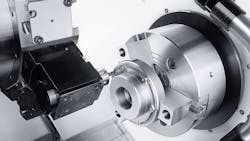Focus on Industrial Goods, Not Sectors in EU-US FTA
CECIMO – the consortium of European machine-tool builders’ trade associations — endorsed the prospect of the European Union and the U.S. establishing regulatory cooperation and eliminating "non-tariff barriers" for industrial goods, two prospects raised in the current planning meetings toward a trade deal. It emphasized, however, that the discussion should remain focused on products, not on industrial sectors.
President Trump and European Commission president Jean-Claude Juncker last year agreed to discuss a new trans-Atlantic trade relationship, and in September an Executive Working Group was formed to identify specific steps for regulatory cooperation.
According to Marcus Burton, non-executive director at Yamazaki Mazak and chairman of CECIMO’s Economic Committee, “focusing trade talks on industrial products and regulatory alignment for machine tools in particular will be key in resuscitating the trans-Atlantic trade relationship between the two biggest world economies and rebuilding business confidence in global trade.”
The European Association of the Machine Tool Industries and Related Manufacturing Technologies (CECIMO) is comprised of the trade associations for 15 countries, which represent approximately 1,500 business in Europe (EU, plus EFTA and Turkey), and 98% of the total machine tool production in Europe and about 33% worldwide. Over 75% of CECIMO production is shipped abroad, and half of it is exported outside Europe.
The group’s statement on machine-tool trade with the U.S. was prompted by the release of an interim report from the Executive Working Group structuring the free-trade agreement discussions, co-chaired by U.S. and EU officials, and by the European Parliament’s vote in mid-February, endorsing the negotiation terms for limited EU-U.S. talks.
CECIMO’s statement detailed that "non-tariff barriers remain the main obstacles" for its members in trade with the U.S.
Machine tools are core technology “without which no manufacturing process would be possible,” the group reiterated, and because machine tools are imported into both the EU and U.S. with very low or minimal tariffs, non-tariff barriers are the main obstacles to companies seeking to export machine tools to U.S. customers.
“The lack of reciprocity in conformity assessments between EU and U.S. (federal and state level) certification bodies and standards entail important administrative and financial costs for companies – especially SMEs,” CECIMO stated. “Other issues such as visas for service personnel and overly-protective product liability rules in the U.S. should be tackled as well, without lowering product quality requirements. However, to ensure progress in the trade talks, the scope of the negotiations should be focused on industrial products and avoid sectors, which the European Parliament had requested to include during its vote on 19 February.”
“European policymakers need to ensure that the interests of European machine tool builders are prioritised and that European manufacturing technologies preserve their competitive position on the global market,” stated CECIMO president Dr. Roland Feichtl, a member of the supervisory board of Krauseco Werkzeugmaschinen GmbH.
